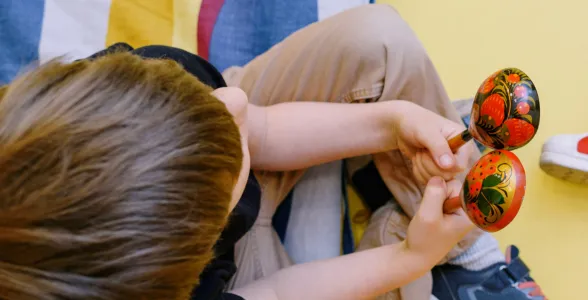
Music Therapy and Mental Health
The last two years have taken a toll on people's mental health and wellbeing. We wanted to therefore shine a light on some of the ways that Music Therapy can support people who are struggling in this way.
We spoke to our Music Therapist, Alice who gave us an insight into the work that they do in this area. If you or someone you know is struggling and would like to see if Music Therapy can help, please do get in touch.
Introductions
I’m a Neurologic Music Therapist; I work in a neuro-rehabilitation unit with patients with brain injury, and also out in the community with individual children and adults with complex needs. I also run music therapy groups for adults with mental health difficulties.
Your work in mental health
During the pandemic, I ran two music therapy pilot projects, which ran online via Zoom. One was a Music Wellbeing group for transgender and non-binary adults, which supported their ongoing voice therapy work and explored links between voice and identity. The other project was a mental health focussed Music Therapy support group for members of Meridian (formerly the Chinese Mental Health Association), to help those suffering from anxiety and isolation during the lockdowns. These groups each ran for 12 weeks, and people who attended regularly said they felt significant improvements in their mental health and felt far less isolated.
A typical session
It varies depending on the needs of the person, but I will always start with a check-in to gauge how the client is feeling, and support them in expressing this in whatever way they want to. Some clients will use words; others might choose to use a visual representation of their mood, like colours or smiley faces. For groups I often use the Feelings Wheel, a coloured circular diagram split into different descriptors of mood which clients can choose from. We then often make sounds that reflect or represent those feelings - this can be done with percussion instruments, and with non-verbal clients, I encourage them to vocalise if they can.
If I’m working with a group or individual for a longer period of time, I create a Mood Playlist that they can add to with songs that reflect how they feel each session, or in between. I’ve found this can be a really useful stepping stone to a client creating their own music in therapy, and songwriting is an immensely powerful tool for mental wellbeing and expression. I often find that clients are wary of writing their own songs at first because they worry that their abilities will be judged - but once they get into the process, all sorts of emotions start coming up!
How music therapy helps
I think music therapy is such a powerful catalyst for improving mental health because it offers people a different way of communicating - whether that’s expressing yourself in lyrics rather than plain words, or using different musical instruments and methods of playing to convey your mood, or even creating playlists to help you process your feelings. Music also has very strong links to memory and identity - almost all of us have intense emotions related to songs or pieces from points in our parts - so music therapy can help support that sense of personhood when it feels like depression, anxiety etc has taken away who we are. Music therapy provides coping mechanisms that can be transferred over into other parts of life, and music therapy in group settings can reduce people’s isolation and loneliness, reminding them that they are not alone in their situation.
Your proudest moment
When working with the Meridian group during the pandemic, some of the group members queried how on earth we were going to do any collaborative creating over Zoom. I wasn’t sure myself how it might work at first, especially with added difficulties like language barriers (a lot of the members spoke English as a second or even third language), but we found ways through the difficulties and the group wrote two collaborative songs together. Using the familiar song ‘I Wish I Knew How It Would Feel To Be Free’ by Nina Simone and the hymn ‘Amazing Grace’ as frameworks, the group took it in turns to write lyrics on the theme of ‘hopes for the future’ and how they wished to feel. None of them had ever written a song before, and they were all incredibly proud of the work they had done to create something new - it was a fantastic moment when they realised what they had done!
What people can do at home
Supporting a friend or relative with mental health difficulties can be challenging, and what works for one person might not work for another, but music is something we all have in common. If music therapy isn’t available or appropriate, encourage the person to join a community music programme - learning an instrument or joining a community choir. Ask them to create playlists of music that fits certain moods, for example for motivation, relaxation, or inspiration. Chiltern Music Therapy also has a Mental Wellbeing Resource Pack available to buy from our website, which has lots of musical ideas and tasks such as guided drawing and writing exercises, songwriting tips, and mindfulness exercises to promote good mental health.
Support our Work
Help us to provide Music Therapy to the most vulnerable and isolated members of our society
Donate here

.webp)


.png)